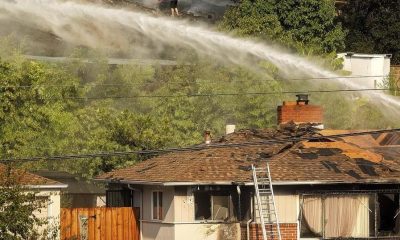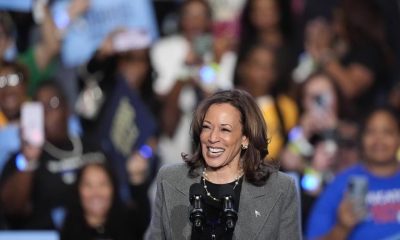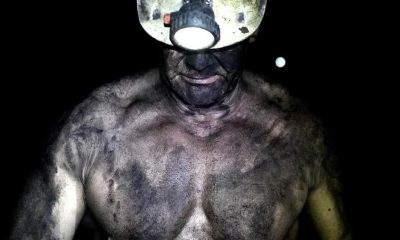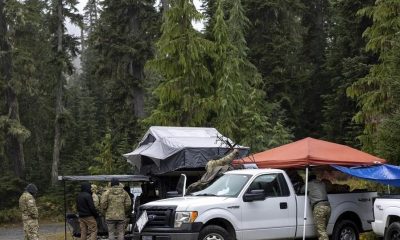Reviews and recommendations are unbiased and products are independently selected. Postmedia may earn an affiliate commission from purchases made through links on this page.
Real eState
Edmonton’s real estate market increasingly on radar of investors – Edmonton Journal
Homes here offer significant value, as they can generate cash flow after monthly costs

Article content
Edmonton’s real estate market has been heating up since the end of the lockdown last spring, and investors are catching on, eyeing the market for its value relative to larger Canadian cities, according to two experts.
Advertisement
Article content
Seasoned real estate investors Patrick Francey and JG Francoeur with the Real Estate Investment Network (REIN) recently spoke with the Edmonton Journal about opportunities for investing in the city’s residential real estate.
Both agree the capital city represents a significant value opportunity where buyers can get more for their dollar than in other markets.
“We’ve been very bullish on Edmonton … for the past year at least, and even before that, prior to the pandemic, we were starting to see Alberta’s economy recover, in turn, offering great investment opportunities in real estate,” says Francey, CEO of REIN.
He further notes the market is not as far along in Edmonton as it is in Calgary.
“But we look at what goes on in Calgary, and we see the future of what will go on with the market in Edmonton.”
Advertisement
Article content
Both cities experienced a multi-year decline in real estate prices due to the downturn in the oil and gas economy. Calgary, he adds, is further along in its recovering price-wise, and it has caught more attention from investors seeking to purchase single-family detached homes, townhomes, condominiums and duplexes at significantly less cost than in most parts of British Columbia and Ontario.
At moment, Edmonton offers slightly better opportunities as the average price of a home in the city is about $401,000 versus about $441,000 in Calgary, Canadian Real Estate Association figures show.
“What you can find … in Edmonton, quite easily relative to what’s going on in B.C. and Ontario, is real estate that will produce cash flow,” he says.
Advertisement
Article content
“So long-term, when your real estate produces a cash flow, you don’t need to rely as much on capital appreciation to make it a profitable investment.”
He notes that investors can expect to generate a positive cash of about $300 to $700 a month after costs in monthly rent based on the average price of a home in the city. At the same, investors can also expect to build equity with each mortgage payment amid a marketplace where home values and rents are on the rise.
“In short, Edmonton is on sale relative to the rest of the major cities in Canada,” says John Carter, realtor with Re/Max River City.
He further adds seeing an increase recently in buyers from B.C. and Ontario seeking to invest in the city’s market “because returns are significantly better, sometimes double.”
Advertisement
Article content
In Edmonton, for example, investors can buy a condominium for $200,000, and rent it out for about $1,200 a month. In Toronto, a similar condo would cost “at least $500,000” and would rent for about $1,800 a month, he says.
Francoeur further notes the Alberta market offers more room to grow compared with B.C. and Ontario, which are near or at their peaks.
“The main thing is the Alberta market has way more room to increase,” he says. “The second thing is properties cash flow better than anywhere else in the country.”
Francoeur adds rents also have room to grow as more demand is expected in the coming months with a return to normalcy, fuelling job growth and migration.
“The major centres are at an opposite place,” he says. “Rents and values are at an all-time high, so investors have a harder time making it work.”
Real eState
Here are some facts about British Columbia’s housing market

Housing affordability is a key issue in the provincial election campaign in British Columbia, particularly in major centres.
Here are some statistics about housing in B.C. from the Canada Mortgage and Housing Corporation’s 2024 Rental Market Report, issued in January, and the B.C. Real Estate Association’s August 2024 report.
Average residential home price in B.C.: $938,500
Average price in greater Vancouver (2024 year to date): $1,304,438
Average price in greater Victoria (2024 year to date): $979,103
Average price in the Okanagan (2024 year to date): $748,015
Average two-bedroom purpose-built rental in Vancouver: $2,181
Average two-bedroom purpose-built rental in Victoria: $1,839
Average two-bedroom purpose-built rental in Canada: $1,359
Rental vacancy rate in Vancouver: 0.9 per cent
How much more do new renters in Vancouver pay compared with renters who have occupied their home for at least a year: 27 per cent
This report by The Canadian Press was first published Oct. 17, 2024.
The Canadian Press. All rights reserved.
Real eState
B.C. voters face atmospheric river with heavy rain, high winds on election day

VANCOUVER – Voters along the south coast of British Columbia who have not cast their ballots yet will have to contend with heavy rain and high winds from an incoming atmospheric river weather system on election day.
Environment Canada says the weather system will bring prolonged heavy rain to Metro Vancouver, the Sunshine Coast, Fraser Valley, Howe Sound, Whistler and Vancouver Island starting Friday.
The agency says strong winds with gusts up to 80 kilometres an hour will also develop on Saturday — the day thousands are expected to go to the polls across B.C. — in parts of Vancouver Island and Metro Vancouver.
Wednesday was the last day for advance voting, which started on Oct. 10.
More than 180,000 voters cast their votes Wednesday — the most ever on an advance voting day in B.C., beating the record set just days earlier on Oct. 10 of more than 170,000 votes.
Environment Canada says voters in the area of the atmospheric river can expect around 70 millimetres of precipitation generally and up to 100 millimetres along the coastal mountains, while parts of Vancouver Island could see as much as 200 millimetres of rainfall for the weekend.
An atmospheric river system in November 2021 created severe flooding and landslides that at one point severed most rail links between Vancouver’s port and the rest of Canada while inundating communities in the Fraser Valley and B.C. Interior.
This report by The Canadian Press was first published Oct. 17, 2024.
The Canadian Press. All rights reserved.
News
No shortage when it comes to B.C. housing policies, as Eby, Rustad offer clear choice

British Columbia voters face no shortage of policies when it comes to tackling the province’s housing woes in the run-up to Saturday’s election, with a clear choice for the next government’s approach.
David Eby’s New Democrats say the housing market on its own will not deliver the homes people need, while B.C. Conservative Leader John Rustad saysgovernment is part of the problem and B.C. needs to “unleash” the potential of the private sector.
But Andy Yan, director of the City Program at Simon Fraser University, said the “punchline” was that neither would have a hand in regulating interest rates, the “giant X-factor” in housing affordability.
“The one policy that controls it all just happens to be a policy that the province, whoever wins, has absolutely no control over,” said Yan, who made a name for himself scrutinizing B.C.’s chronic affordability problems.
Some metrics have shown those problems easing, with Eby pointing to what he said was a seven per cent drop in rent prices in Vancouver.
But Statistics Canada says 2021 census data shows that 25.5 per cent of B.C. households were paying at least 30 per cent of their income on shelter costs, the worst for any province or territory.
Yan said government had “access to a few levers” aimed at boosting housing affordability, and Eby has been pulling several.
Yet a host of other factors are at play, rates in particular, Yan said.
“This is what makes housing so frustrating, right? It takes time. It takes decades through which solutions and policies play out,” Yan said.
Rustad, meanwhile, is running on a “deregulation” platform.
He has pledged to scrap key NDP housing initiatives, including the speculation and vacancy tax, restrictions on short-term rentals,and legislation aimed at boosting small-scale density in single-family neighbourhoods.
Green Leader Sonia Furstenau, meanwhile, says “commodification” of housing by large investors is a major factor driving up costs, and her party would prioritize people most vulnerable in the housing market.
Yan said it was too soon to fully assess the impact of the NDP government’s housing measures, but there was a risk housing challenges could get worse if certain safeguards were removed, such as policies that preserve existing rental homes.
If interest rates were to drop, spurring a surge of redevelopment, Yan said the new homes with higher rents could wipe the older, cheaper units off the map.
“There is this element of change and redevelopment that needs to occur as a city grows, yet the loss of that stock is part of really, the ongoing challenges,” Yan said.
Given the external forces buffeting the housing market, Yan said the question before voters this month was more about “narrative” than numbers.
“Who do you believe will deliver a better tomorrow?”
Yan said the market has limits, and governments play an important role in providing safeguards for those most vulnerable.
The market “won’t by itself deal with their housing needs,” Yan said, especially given what he described as B.C.’s “30-year deficit of non-market housing.”
IS HOUSING THE ‘GOVERNMENT’S JOB’?
Craig Jones, associate director of the Housing Research Collaborative at the University of British Columbia, echoed Yan, saying people are in “housing distress” and in urgent need of help in the form of social or non-market housing.
“The amount of housing that it’s going to take through straight-up supply to arrive at affordability, it’s more than the system can actually produce,” he said.
Among the three leaders, Yan said it was Furstenau who had focused on the role of the “financialization” of housing, or large investors using housing for profit.
“It really squeezes renters,” he said of the trend. “It captures those units that would ordinarily become affordable and moves (them) into an investment product.”
The Greens’ platform includes a pledge to advocate for federal legislation banning the sale of residential units toreal estate investment trusts, known as REITs.
The party has also proposed a two per cent tax on homes valued at $3 million or higher, while committing $1.5 billion to build 26,000 non-market units each year.
Eby’s NDP government has enacted a suite of policies aimed at speeding up the development and availability of middle-income housing and affordable rentals.
They include the Rental Protection Fund, which Jones described as a “cutting-edge” policy. The $500-million fund enables non-profit organizations to purchase and manage existing rental buildings with the goal of preserving their affordability.
Another flagship NDP housing initiative, dubbed BC Builds, uses $2 billion in government financingto offer low-interest loans for the development of rental buildings on low-cost, underutilized land. Under the program, operators must offer at least 20 per cent of their units at 20 per cent below the market value.
Ravi Kahlon, the NDP candidate for Delta North who serves as Eby’s housing minister,said BC Builds was designed to navigate “huge headwinds” in housing development, including high interest rates, global inflation and the cost of land.
Boosting supply is one piece of the larger housing puzzle, Kahlon said in an interview before the start of the election campaign.
“We also need governments to invest and … come up with innovative programs to be able to get more affordability than the market can deliver,” he said.
The NDP is also pledging to help more middle-class, first-time buyers into the housing market with a plan to finance 40 per cent of the price on certain projects, with the money repayable as a loan and carrying an interest rate of 1.5 per cent. The government’s contribution would have to be repaid upon resale, plus 40 per cent of any increase in value.
The Canadian Press reached out several times requesting a housing-focused interview with Rustad or another Conservative representative, but received no followup.
At a press conference officially launching the Conservatives’ campaign, Rustad said Eby “seems to think that (housing) is government’s job.”
A key element of the Conservatives’ housing plans is a provincial tax exemption dubbed the “Rustad Rebate.” It would start in 2026 with residents able to deduct up to $1,500 per month for rent and mortgage costs, increasing to $3,000 in 2029.
Rustad also wants Ottawa to reintroduce a 1970s federal program that offered tax incentives to spur multi-unit residential building construction.
“It’s critical to bring that back and get the rental stock that we need built,” Rustad said of the so-called MURB program during the recent televised leaders’ debate.
Rustad also wants to axe B.C.’s speculation and vacancy tax, which Eby says has added 20,000 units to the long-term rental market, and repeal rules restricting short-term rentals on platforms such as Airbnb and Vrbo to an operator’s principal residence or one secondary suite.
“(First) of all it was foreigners, and then it was speculators, and then it was vacant properties, and then it was Airbnbs, instead of pointing at the real problem, which is government, and government is getting in the way,” Rustad said during the televised leaders’ debate.
Rustad has also promised to speed up approvals for rezoning and development applications, and to step in if a city fails to meet the six-month target.
Eby’s approach to clearing zoning and regulatory hurdles includes legislation passed last fall that requires municipalities with more than 5,000 residents to allow small-scale, multi-unit housing on lots previously zoned for single family homes.
The New Democrats have also recently announced a series of free, standardized building designs and a plan to fast-track prefabricated homes in the province.
A statement from B.C.’s Housing Ministry said more than 90 per cent of 188 local governments had adopted the New Democrats’ small-scale, multi-unit housing legislation as of last month, while 21 had received extensions allowing more time.
Rustad has pledged to repeal that law too, describing Eby’s approach as “authoritarian.”
The Greens are meanwhile pledging to spend $650 million in annual infrastructure funding for communities, increase subsidies for elderly renters, and bring in vacancy control measures to prevent landlords from drastically raising rents for new tenants.
Yan likened the Oct. 19 election to a “referendum about the course that David Eby has set” for housing, with Rustad “offering a completely different direction.”
Regardless of which party and leader emerges victorious, Yan said B.C.’s next government will be working against the clock, as well as cost pressures.
Yan said failing to deliver affordable homes for everyone, particularly people living on B.C. streets and young, working families, came at a cost to the whole province.
“It diminishes us as a society, but then also as an economy.”
This report by The Canadian Press was first published Oct. 17, 2024.
-

 News15 hours ago
News15 hours agoCalmer weather helps contain Oakland, California, fire that forced evacuations
-

 News21 hours ago
News21 hours agoBC NDP, Conservatives in tight fight to the finish, with no clear winner in B.C. election |
-

 News15 hours ago
News15 hours agoIsrael says it will target Hezbollah’s financial arm and begins striking Beirut
-

 Politics21 hours ago
Politics21 hours agoHarris tells Black churchgoers that people must show compassion and respect in their lives
-

 News15 hours ago
News15 hours agoIn one portrait, an AP Photographer tells the story of how difficult the job of a miner is
-

 News21 hours ago
News21 hours agoThe Vessel, a Manhattan tourist site closed after suicides, reopens with new safety features
-

 News15 hours ago
News15 hours agoGeorgia authorities investigating a dock gangway collapse that killed 7 on a historic island
-

 News15 hours ago
News15 hours ago2 Navy aviators are declared dead after a fighter jet crashed in Washington state






















